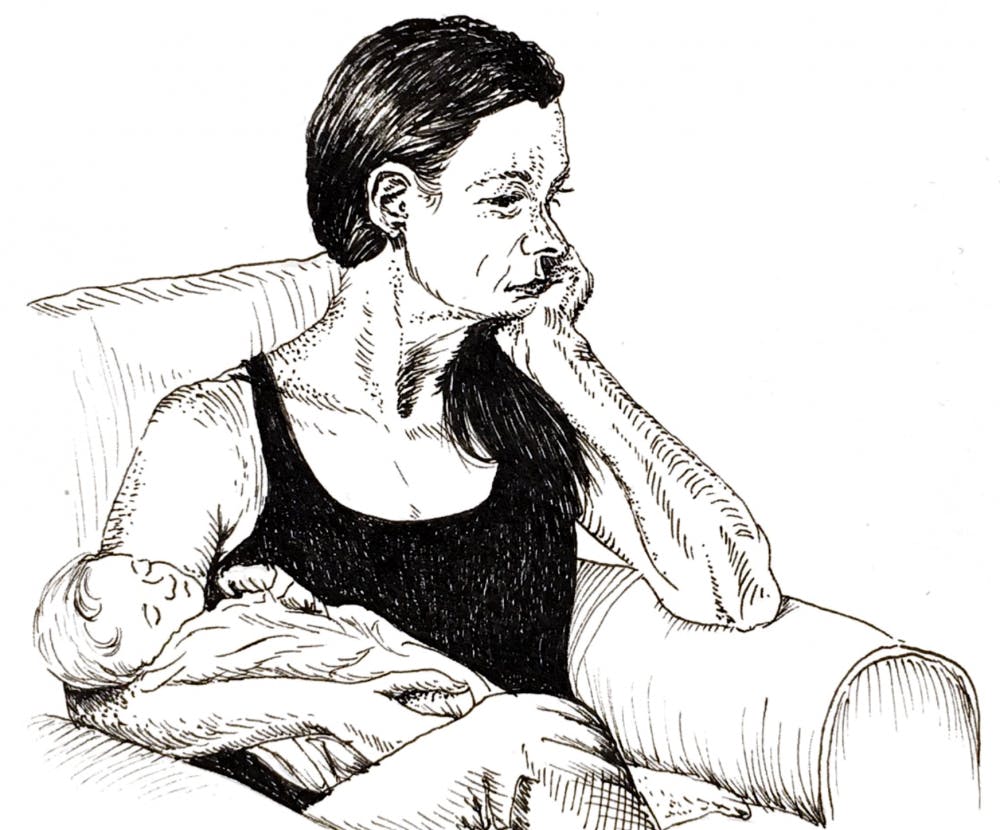A national panel of mental health experts recently named a program developed by a University researcher as one of the first clinically validated models to address perinatal depression, which occurs during and after pregnancy.
Researchers and clinicians at Brown and Northwestern University have developed two counseling programs supported by the U.S. Preventive Services Task Force for the condition, which affects one in seven mothers in the United States.
Counseling-based interventions such as cognitive behavioral therapy and interpersonal therapy — both clinically validated forms of therapy for promoting healthy behavior change — are “the most effective interventions” for preventing perinatal depression, said Melissa Simon, vice chair for clinical research in the Department of Obstetrics and Gynecology at Northwestern, who was appointed to the task force in 2017. “There is no evidence of (the effectiveness of) pharmaceutical medication for preventing depression,” Simon said, citing the lack of effective non-counseling interventions for postpartum depression in women.
According to the study, because postpartum depression heavily affects socioeconomically disadvantaged women, the task force focused on patients with risk factors such as personal or family history of depression, history of physical, emotional or sexual abuse, a previous unplanned or unwanted pregnancy, single motherhood or high stress levels.
The task force recommended ROSE, or Reach Out, Stay Strong, Essentials for New Moms, a counseling program developed by Caron Zlotnick, Brown professor of obstetrics and gynecology and psychiatry and human behavior. The program involves four counseling sessions during pregnancy and one additional session within one month after childbirth and has been shown to reduce the incidence of perinatal depression by more than half. Designed for both first-time mothers and mothers with babies less than six months old, the sessions involves primarily interpersonal therapy.
“We teach women how to communicate effectively using role play, how to ask for what they need … and resolve interpersonal conflicts that are common around childbirth. The focus is on helping women identify who their supports are,” Zlotnick said.
ROSE has been implemented in numerous clinics across Florida, Rhode Island, Mississippi and Japan. Jennifer Johnson, clinical psychologist and Brown professor of psychiatry and behavioral medicine, has helped implement ROSE counseling programs across the country and reports that the program has been administered in 20 clinics thus far and aims to expand to 90 clinics serving prenatal women in the near future.
“We’re looking at integrating this into routine clinical care. … We can (eventually) talk to policy makers … to see what it takes to scale up this intervention … because if we can actually prevent (postpartum depression) to begin with, that would be great,” she said.
The other program named by the task force with promising results for postpartum depression is called Mothers and Babies, a group counseling program developed by Darius Tandon, co-director of the Institute for Public Health and Medicine at Northwestern. The six-week program was inspired by Tandon’s analysis of home visiting programs for mothers and includes CBT, communication skills training and interpersonal therapy. Mothers and Babies aims to fill the need for mental health care services in home visiting programs and increase the likelihood that new mothers will take advantage of counseling services.
“Let’s bring the intervention into the home visiting program,” Tandon said.
Mothers and Babies derives from a 12-week program by Ricardo Muñoz, former professor of psychology at University of California, San Francisco and professor of clinical psychology at Palo Alto University. Tandon has since continued to refine several aspects of the program with additional studies. One study investigates the effectiveness of a home-based one-on-one counseling model, which aims to address transportation barriers faced by some women who might otherwise use group counseling outside the home. Another study investigates whether paraprofessionals like midwives can be as effective as clinicians. “What we would like to show in the comparative (non-inferiority) study is that … home visitors are equally good at getting similar results to clinicians,” he said.
The program is now being used by home visiting programs in 20 states and seeks to both spread across the country and develop a similar model called Fathers and Babies. “For all individuals seeking mental health, there’s stigma associated with seeing a therapist or using mental health services. And one of the things Mothers and Babies does is it destigmatizes mental health. … It makes it less daunting.”
A previous version of this article stated that Caron Zlotnick is a professor of obstetrics and gynecology, when in fact she is also a professor of psychiatry and human behavior. In addition, a previous version of this article described the ROSE program as a combination of CBT and interpersonal therapy. In fact, the program is primarily focused on interpersonal therapy.





